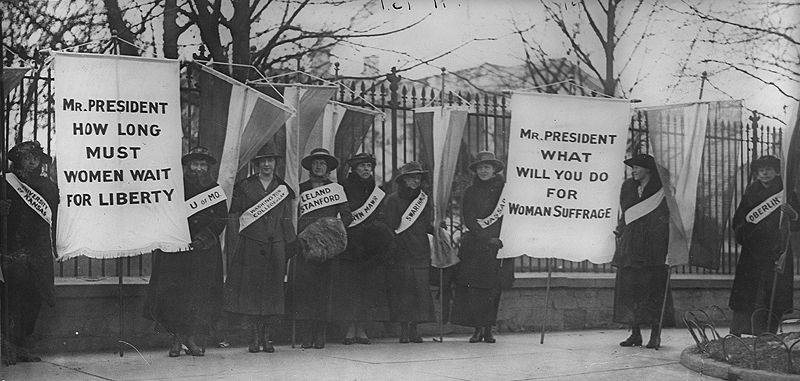A few weeks ago my history professor, Jennifer Dilley, assigned her class to watch “Iron Jawed Angels” to tie in with our study of the suffrage movement. After watching the film I felt that as a woman I had a responsibility to share the works of these women and continue their fight for equal treatment.
The film is by far one of the most empowering, influential and eye-opening works I have ever watched, yet it also left a bitter taste in my mouth. Let me explain why.
Based on a true story, the film depicts passionate young women and their fight for American women’s right to vote.
Set in 1912, the film is focused on some of the most influential women of the period, such as Alice Paul, Lucy Burns, Anna Howard Shaw and Carrie Chapman Catt and their journey with the North American Women’s Suffrage Association (NAWSA).
While being committed suffragists and feminists they often felt the pull of both “private” and “public” spheres.
Women of this time were expected to be caregivers, housekeepers and wives. They were obligated to stay where they were needed, which was in the private sphere. If a woman dared to flirt with the public sphere, they were seen as radical and unfit to participate in the private sphere as well.
Most women were too timid or too committed to their role in the private sphere to enter the “man’s world” of politics or economics. Equal treatment was an unfathomable idea.
Whether it was organizing women’s marches, picketing the White House, questioning President Wilson, or traveling the country to make public speeches, these women not only put in time and energy into their movement, but also dealt with public and private harassment. They were threatened, beaten and thrown in jail for no lawful reason. It took a huge toll on the fight for suffrage.
The women depicted had to keep a strong face for their comrades, but they also for themselves.
To display themselves as strong and independent women 24/7 was a full time job and it often was lonely and emotionally draining.
While these women were fighting for their right to vote and their right for equal treatment, they were only human. These women were deprived by society of having any emotional, physical or mental connection with men in fear of looking weak. The film does a great job on touching on the women’s struggle with connecting and building relationships, while also maintaining their role as a feminist.
The film has startling parallels to today’s society, where young activists struggle with issues such as protesting their president and also balancing their love lives and careers.
“The way the movie depicts this way of the president calling for us to spread democracy around the world, but he’s not offering it to half of the population in this country. Women are marching in front of the White House and asking ‘how can you be trying to spread democracy when we don’t even have it here?’ and I like the way it calls attention to that. We are told even now that we are free and we are a democracy, but really how true is all of that?” Dilley said.
Even today women activists struggle with what it means to be a feminist and where the line is drawn. To what extent do we stop ourselves before we burn out? To what point are we devaluing ourselves of basic emotional, physical and mental feelings?
To this day women are constantly told we are too emotional, unstable and unfit for certain positions and views. To this I respond, we are able, strong and worthy of equal pay, equal treatment and all of this should not continue to be questioned. If a man can do it, so can we. I am proud to be a feminist and you should be too.
In honor of Women’s History Month, take some time to watch “Iron Jawed Angels” to become aware and informed about women’s struggle to get where we are now.
The film can be accessed on YouTube.






